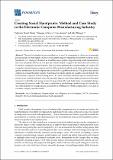Creating Social Handprints: Method and Case Study in the Electronic Computer Manufacturing Industry
Author(s)
Benoit Norris, Catherine; Norris, Gregory A.; Azuero, Lina; Pflueger, John
Downloadresources-08-00176.pdf (4.075Mb)
Terms of use
Metadata
Show full item recordAbstract
This article introduces a process that can be used by companies to obtain an increasingly precise picture of their supply chain social footprint (negative impacts) and identify potential social handprints (i.e., changes to business as usual that create positive impacts) using social organizational life cycle assessment (SO-LCA). The process was developed to apply to the electronics sector but can be used by companies in any industry. Our case study presents the social footprint of a typical US computer manufacturing company and identifies potential salient social risks and hotspots using generic information about the inputs that are related to a global trade model. The global trade model enables us to map the likely supply chain based on where inputs are usually sourced from by the US electronic computer manufacturing sector. In order to identify material impacts, normalization factors were created and used. Once the material impacts and salient risks are known, it becomes necessary to identify root causes in order to plan actions that will truly make a meaningful change, addressing the issues at stake. The article concludes by establishing a methodology that enables the use of the industry-level impacts and assessment in combination with the organization’s own data to calculate company-specific results.
Date issued
2019-11Department
MIT Materials Research LaboratoryJournal
Resources
Publisher
MDPI AG
Citation
Benoit Norris, Catherine et al. "Creating Social Handprints: Method and Case Study in the Electronic Computer Manufacturing Industry." Resources 8, 4 (November 2019): 176 © 2019 The Authors
Version: Final published version
ISSN
2079-9276